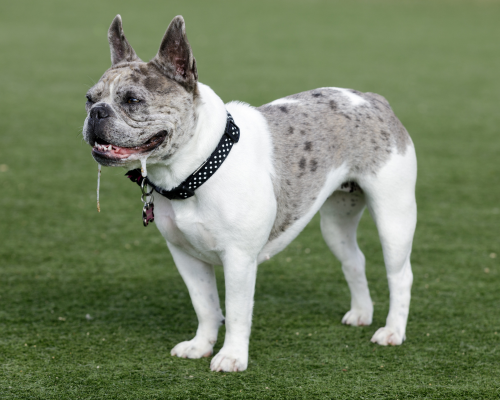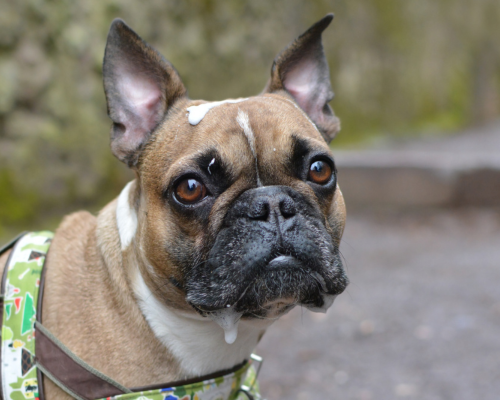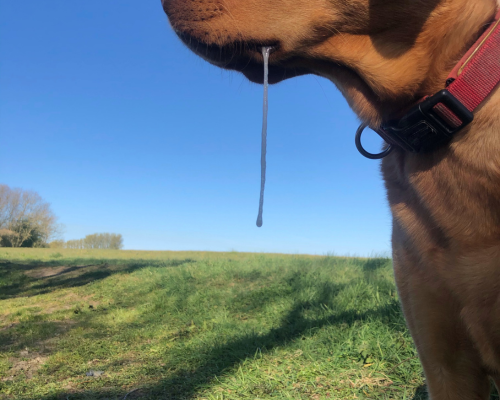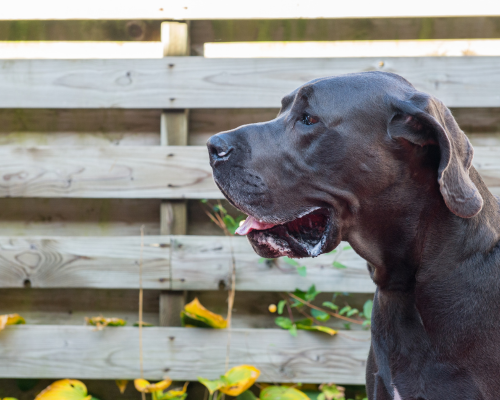Why is My Dog Drooling Around a New Puppy? 8 Reasons
Why is My Dog Drooling Around a New Puppy? 8 Reasons

Vet Reviewed

By: Sarah Hodgson
December 11, 2023
- Posted in Dogs
Table of Contents
Dogs drooling isn't something new but suddenly when you're dog is drooling when being around a new puppy that they haven't seen before that is odd behavior. This behavior will probably leave you wondering why it occurs.
In this article, we will explore the reasons behind this drooling. So let's dive in!
Why Do Dogs Drool Around New Puppies?
Below are eight reasons as to why dogs drool around puppies they haven't seen before.
1. Excitement:
Dogs may drool around a new puppy due to heightened excitement. The anticipation of play and social interaction can trigger an adrenaline rush, leading to increased salivation. This is a natural response to the positive stimuli of a new companion, reflecting the dog's eagerness for engagement.
2. Social Bonding:
Drooling as a sign of social bonding indicates a positive emotional connection. Dogs often use body language to convey their feelings, and the presence of a new puppy may evoke a sense of camaraderie. The drooling serves as a non-verbal expression of the desire to establish a friendly and affiliative relationship.
3. Stress or Anxiety:
On the contrary, stress or anxiety about the new puppy's presence can result in excessive drooling. The uncertainty and change in dynamics may make some dogs nervous, causing an increase in salivation as a physiological response to the emotional unease.
4. Submission:
Dogs display submissive behaviors to establish hierarchy. If your dog perceives the new puppy as dominant or is attempting to communicate submission, drooling can be a submissive gesture. It signifies deference and a willingness to acknowledge the social order within the pack.
5. Curiosity:
Dogs explore their surroundings through their senses. The introduction of a new puppy brings novel scents and sights, sparking curiosity. The increased drooling can be a result of the dog's heightened sensory perception as they process and analyze the unfamiliar elements in their environment.

6. Hunger or Food-Related:
Associating the new puppy with meals or treats can trigger drooling in anticipation of shared food experiences. Dogs often link positive events, such as mealtime, with pleasurable sensations, leading to increased salivation when they expect enjoyable interactions centered around food.
7. Territorial Behavior:
Dogs are inherently territorial animals. The introduction of a new puppy may provoke territorial instincts, leading to an increased drool response. This behavior signals the dog's awareness of changes in its living space and a potential need to mark or defend its territory.
8. Medical Issues:
Excessive drooling can sometimes be an indicator of underlying health problems. Oral health issues, discomfort, or pain may lead to heightened salivation. If the drooling appears abnormal or persists, consulting with a veterinarian is crucial to rule out any medical concerns and ensure the well-being of your dog.
Should You Be Concerned?
While drooling around a new puppy is generally normal, it is important to assess the overall behavior and health of your dog.
If the drooling is accompanied by other concerning symptoms such as aggression, loss of appetite, or lethargy, it is advisable to consult with a veterinarian. These additional signs may indicate an underlying health issue or a more significant behavioral problem that requires professional intervention. However, if your dog appears otherwise healthy and the drooling is consistent with the reasons mentioned earlier, there is usually no cause for any alarm bells.

How to Stop Your Dog From Drooling Near New Puppies
This might be an odd and quite annoying behavior if your dog encounters new puppies frequently. While the excitement and curiosity associated with meeting new companions are entirely natural, frequent drooling in the presence of new puppies can become bothersome for pet owners. So here are some ways to help prevent and stop it.
Gradual Introductions: When introducing a new puppy to your existing dog, it is essential to do so gradually. Allow them to become familiar with each other's scents and presence before allowing direct physical contact. This gradual introduction can help reduce the excitement and anxiety that may trigger excessive drooling.
Positive Reinforcement: Reward your dog for calm and appropriate behavior around the new puppy. Positive reinforcement, such as treats or praise, can help create positive associations and reduce drooling caused by excitement or stress. Reinforcing desirable behavior will also encourage your dog to establish a harmonious relationship with the new puppy.
Training Commands: Reinforce basic commands such as "sit," "stay," or "leave it" during interactions with new puppies. Training commands can redirect your dog's focus, promoting self-control and minimizing the likelihood of excessive drooling.
Provide Distractions: Engage your dog in activities or provide toys that can redirect their focus away from the new puppy. This can help alleviate feelings of anxiety or jealousy that may contribute to excessive drooling. By redirecting their attention, you can help your dog gradually adjust to the presence of the new puppy without experiencing heightened emotional responses.
Consult with a Professional: If the drooling persists despite your efforts, seek guidance from a professional dog trainer or behaviorist. They can assess the specific triggers and provide tailored advice on modifying the behavior through additional training techniques.

The Bottom Line
So there you have it, Drooling around a new puppy is a common behavior observed in dogs. It can be attributed to various factors such as excitement, submission, and anxiety. While this behavior is generally normal, it is crucial to monitor your dog's overall health and behavior.
So no need to be worried about the drooling except sometimes it can leave quite a mess.
Frequently Asked Questions
Is drooling around new puppies a sign of aggression?
Not necessarily. Drooling can also be a sign of excitement, submission, or a natural response to a change in the environment. Monitoring your dog's body language and overall behavior is crucial in determining their emotional state.
Are certain dog breeds more prone to excessive drooling in these situations?
While individual personalities vary, some breeds are known to be more excitable or prone to drooling. However, the response to new puppies is largely influenced by the dog's upbringing, socialization, and previous experiences.
When should I seek professional help for my dog's drooling behavior?
If the drooling persists despite training efforts, or if you observe signs of distress or anxiety, consulting with a professional dog trainer or behaviorist is recommended. Additionally, a veterinarian should assess any health concerns contributing to the behavior.

Subscribe to Petfluence!
Get updates on the latest posts and more from Petfluence straight to your inbox.